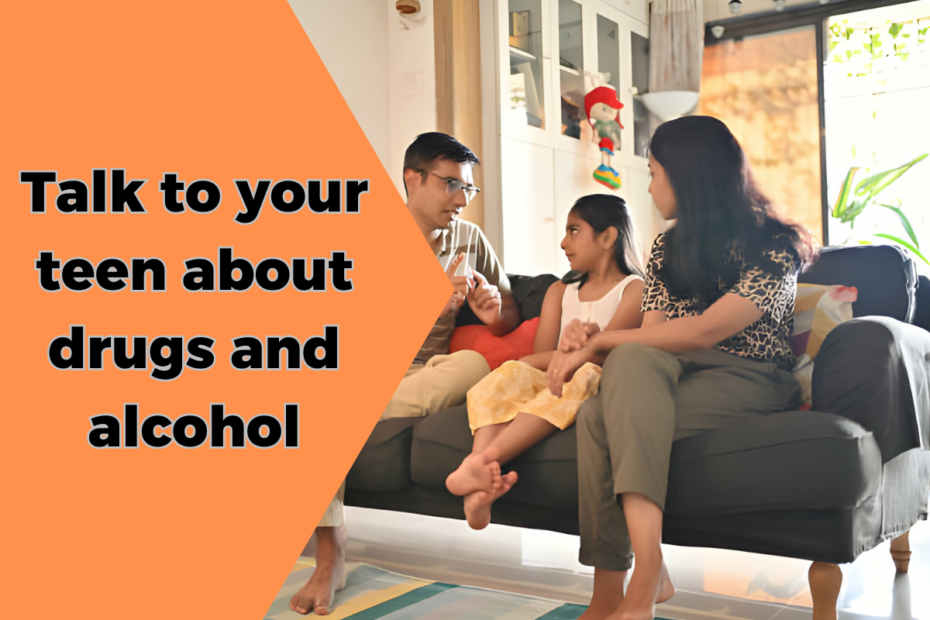Hey Guys I am Donna, and welcome to my parenting blog. As a mother of two, I know how it is important to teach our child about Drugs and alcohol.
It can be hard to know how to talk about drugs and drinking with a teenager without stepping on thin ice. You can talk to your kid about these important things, though, if you break down the walls.
So in this article, we are going to discuss 10 tips on how we can talk to our teens about drugs and alcohol.
so stick with me till the end.
1. Listening and Understanding with Kindness
When your kids trying to say anything about drugs and alcohol, Listen carefully.
Listening actively means paying attention and being genuinely interested in what they have to say. By showing empathy, you recognize their feelings and understand their point of view. Help them work through their problems without judging them.
This will create a safe space where they can be open. Communication that is open and honest makes it easier to have productive conversations about touchy subjects.
When they talk about drugs and booze, remember to listen without talking over them and to understand how they feel. Allow them a spot to say what they want without fear of being judged.
Being understanding and helpful to your teen builds a stronger bond between you, which makes it easier to talk about tough topics. To help them make good choices, you need to be open with them and build trust.
2. Building trust and talking to each other

Okay, so building trust is the most important thin in any kind of relationship.
Make sure your teen feels safe and comfortable talking to you about drugs and drinking.
This will help you build trust and communication. Getting to know someone is important for building trust and relationships.
Be honest about how you feel and let your kid talk without judging them. To communicate clearly, you need to actively listen, summarize, and not attack or make assumptions about other people.
To set limits, show that you understand, ask open-ended questions, and focus on information and support instead of accusations. You can get to know your teen better and start talking about drugs and booze if you listen carefully without talking over them and don’t judge them.
3. Open and Regular Talks
It would help if you talked to your kid often and honestly to build a strong bond of trust.
This will make it easier to talk about touchy things like drinking and drugs.
Pay full attention when you talk. Pay close attention to what they say and don’t judge what they say. Show them that you care about what they have to say.
Tell your child that you will always be there for them. Know that they can always talk to you if they need help or have questions.
Talk about how group pressure affects big decisions. Teach your kid to stay away from bad people and make their own choices.
Talk to each other honestly. Make your rules and fears clear. If you don’t like what your teen says, don’t get mad. This will help them feel safe being honest.
4. Avoiding Negative Approaches
If you want to have a good conversation and understand your child better about drugs and alchole, don’t bring up negative points.
Use positive reinforcement, empathy, and a supportive setting to get your teen to talk to you and get along. It is best to stay away from shocking tactics, graphic material, judgment, and fear-based barriers.
Make it safe for people to talk about their feelings, don’t blame others or the situation, and give them help and honest information. Be honest, ask open-ended questions to get people to talk, and sum up and fix what they hear while they listen.
5. Using Real-Life Examples

Use real-life examples to show your teen the effects of drugs and drinking when you talk about them.
Sharing personal stories and real-life situations can help students understand what their deeds really mean. To make your interactions more powerful, use meaningful stories and shared experiences:
- Personal experiences:You should talk about the stories of people who have had problems because they used drugs and emphasize how that use has changed their lives.
- Real consequences:Talk about the bad things that happen when people abuse drugs and alcohol, like how it hurts their health, gets them in trouble with the law, and makes their relationships worse.
Okay let me tell you an example for this: (use some of this type of real-life experience example)
“I have a friend from high school named Amanda who started drinking at parties when she was 15. It was usually just on the weekends and she thought it was no big deal. But soon, she was drinking every weekend, and even sneaking alcohol during the week. By our senior year, her grades had plummeted, she had lost old friends, and she got arrested for possession of marijuana. The alcohol had changed her personality and priorities. She barely graduated high school and didn’t end up going to college like she had always planned. Last I heard, she is still struggling with addiction over 10 years later. Her substance abuse derailed and ruined her life plans and potential.”
This type of story can show kids how dangerous drugs and drinking can be when they are young. As always, feel free to ask me anything or need another sample.
6. Being Careful When You Say “No”
When you talk to your kid about drugs and alcohol, stress how they hurt their health, relationships, and overall well-being. Understand how hard things are for your kid and put them first. Help them understand the risks of using drugs, and build trust by letting them talk about their fears in an open way.
Show that you don’t like it when teens drink and use drugs, but also support their health and success.
You should practice different situations with your child to help them understand drug and alcohol problems. Tell them to think about their options and talk about how to deal with group pressure.
Open conversation and support can strengthen your bond with your teen and give them the power to make smart choices about drugs.
7. Roleplaying and Scenario Discussions

Play a role-playing game with them to help them learn what to do when they have to make a tough choice about drugs or alcohol. You should be able to politely say “no thanks” or “I’m not interested” without getting the wrong idea.
for example:
If you read in the newspaper about a drunk driver who caused an accident or about drug use at your child’s school, it can be a good time to talk. Talk to your teen about things like, “What would you say if someone offered you drugs?” Then help them answer with confidence and help.
8. Ongoing Check-Ins and Follow-Ups
You can help your kid by keeping in touch and following up on talks about drugs and alcohol. Parents need to be involved in their teens’ problems to stay updated about them. Your teen may be able to handle the risks of drugs better if you stress the importance of healthy choices, coping with emotions, and setting limits.
| Parental Involvement | Healthy Choices |
|---|---|
| Engage in open discussions about drugs and alcohol | Encourage participation in positive activities |
| Listen actively to your teen’s concerns and experiences | Educate about the benefits of making healthy choices |
| Provide guidance and support without judgment | Establish clear boundaries and consequences for risky behaviors |
Regular check-ins help to stress how important these issues are and give support and direction over time. Remember that being involved is very important for helping your kid make smart choices and form good habits that will benefit their health.
9. Seeking Professional Support When Needed

If you notice that your teen is having problems or feeling uncomfortable because of using drugs, talking to a professional can help you understand the situation better and find resources to help you. Talking to someone for help is a practical thing that can be done to deal with the problem well.
Here are some options to consider:
- Professional Counseling:Your kid who is using drugs can get help from trained counselors who offer individualized therapy. It is safe to have open conversations and get help one-on-one.
- Family Therapy:Getting the whole family involved in treatment can help build ties, improve communication, and deal with underlying family issues that may lead to drug use.
- Support Groups:You can help your teen get better by pushing them to join support groups. These groups can give them a sense of community, understanding, and shared experiences, all of which can be very helpful on their way to recovery.
10. Creating a Supportive Environment
Your teen’s health and recovery from drug use depend on being in a place where people are helpful and understanding. Teenagers can talk about their problems in a safe place if you trust them.
A friendship based on empathy makes it possible to talk about drugs and alcohol in an open and supportive way. By making sure no one judges your child, they are more likely to open up.
If you want to encourage open conversation, listen to your teen without talking over them. To build a friendship with someone, show that you care about how they feel.
If you want to have a good talk, don’t attack people personally or make assumptions. Being honest about how you feel helps others understand. Building trust, empathy, and open conversation with your teen can help them deal with drug problems.
Final Words:
So I think that 10 tips are good enough to teach your child about drugs and alcohol.
Talking to teens about drugs and drinking is a process, not a one-time event. Like planting a seed, honest conversation and understanding will strengthen your relationship.
Talk to your kid, be patient, and let them know you’re there for them. You can help your kid stop using drugs and start making good decisions.
I want to know your opinion too don’t forget to put it in the comment box.

As a mom of teens and a pediatric Psychologists, I struggled to build trust. Through openly sharing my ups and downs raising two independent-minded kids, I provide practical tips to improve communication and confidently guide your teens into adulthood.
